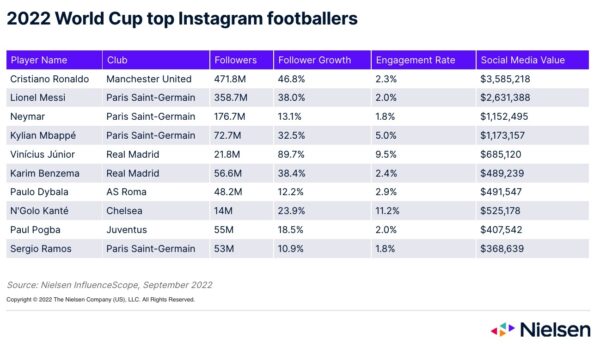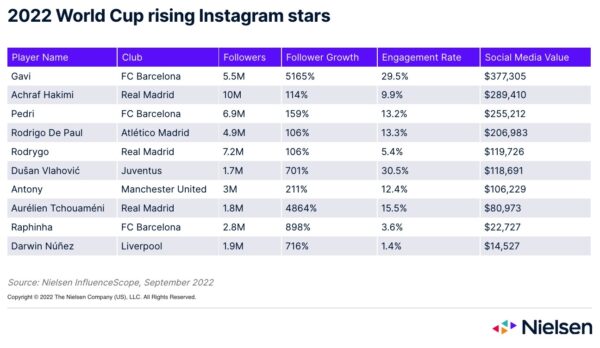Social currency: How much is a World Cup influencer worth?
October 6, 2022

The 2022 FIFA World Cup—a month-long football marathon featuring 64 matches—will attract an estimated 5 billion viewers worldwide1. And the reach of the World Cup extends far beyond the field, with team and player updates, predictions and other content taking over screens and, increasingly, social feeds in the months surrounding the event.
With so many eyes on the tournament, brands are sure to be investing heavily in partnerships with popular players to try and make inroads with new and enthusiastic audiences. But not all sponsorships are equally impactful, and budget-conscious marketers looking to maximize their spend need to identify the best value for their advertising bucks.
According to Nielsen’s 2022 World Football Report, while free-to-air television is still the preferred method of viewing matches (81%) for football fans who watch sports, social media is now a go-to platform for all things football, with 72% of fans claiming they use apps to watch the action. And to meet these fans where they are, marketers should be partnering with players, turning midfielders into influencers and fan engagement into brand engagement.
In general, influencers can heavily sway campaign performance and impact. According to the 2022 Nielsen ROI Report 71% of consumers trust advertising, opinions and product placements from influencers, and influencer marketing drives 80% brand recall and a 9-point increase in both brand affinity and purchase intent relative to consumers who did not see the influencer ads2.
And when it comes to the wide world of sports influencer marketing, football has some of the most powerful figures. Nielsen InfluenceScope measured the average social media value of branded posts for Instagram’s top 10 most influential footballers. This number represents the media value derived from the logo exposure a brand gets when partnering with an influencer.

Cristiano Ronaldo is the most-followed footballer—and the most-followed person overall—on Instagram, with over 471 million followers. His reach, account growth and engagement rate all make him the most impactful influencer in football. A recent Instagram post from Ronaldo promoting his partnership with Clear Haircare garnered over 4 million interactions in the first 24 hours, highlighting the footballer’s extensive reach and impressive fan engagement.
But advertisers don’t need to partner with top influencers to give campaigns a leg-up on the competition. Teaming up with less-followed players still offers the benefits of a rapidly-growing audience. Rising stars also generally have higher engagement rates than their more-followed teammates, so while overall reach is lower, penetration within the fanbase is much higher. Partnerships with up-and-coming footballers can ensure brands get in on the future Cristiano Ronaldo’s early. Because as a player’s fan base grows, so does a brand’s pool of potential customers.

This year’s top upward mover, Barcelona midfielder Gavi, has skyrocketed to social media popularity and now has a social media value eclipsing that of Sergio Ramos, even though Ramos has nearly ten times the followers. Despite his increasing popularity, Gavi’s Instagram timeline lacks any sponsored posts, signaling that brands and advertisers currently face a challenge when it comes to identifying and partnering with these up and coming sports influencers.
But, as with many marketing challenges, the answer—and opportunity—lies in data. Knowing which players have social value today is important, but by identifying the sports influencer superstars of tomorrow, brands and advertisers can maximize the impact of their marketing dollars. With billions of sports fans following the action on social media, brands that are able to harness data to dial in the right combination of influencer and message will score big with audiences—and with campaigns.
Source
- FIFA
- Nielsen Brand Impact Q2 2022 norms




























